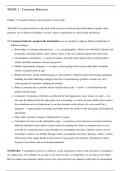Samenvatting
Consumer Behaviour Summary Week 1-3
- Vak
- COBE (COBE)
- Instelling
- NHTV (NHTV)
This summary provides all key information to Consumer Behaviour module of Week 1,2 and 3. Based on the help of my notes, my exam grade for COBE was a 9,2.
[Meer zien]




